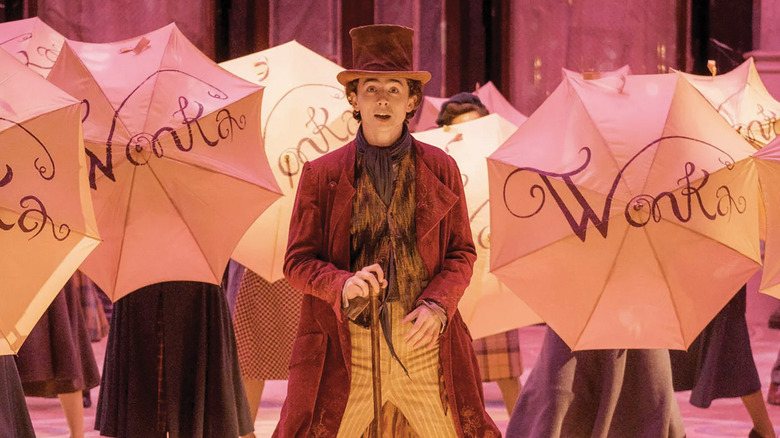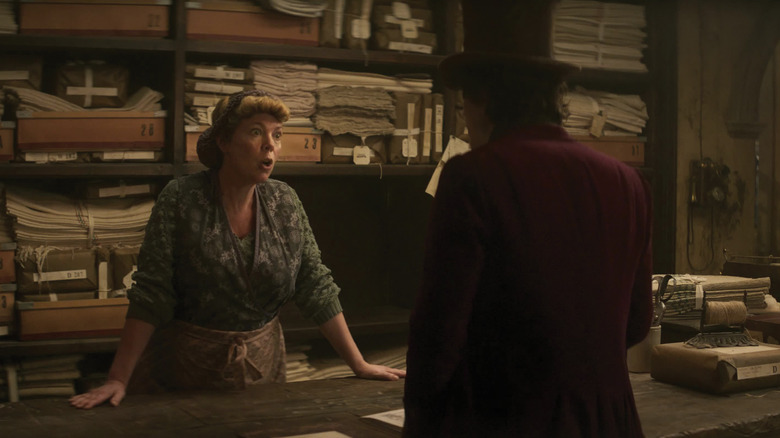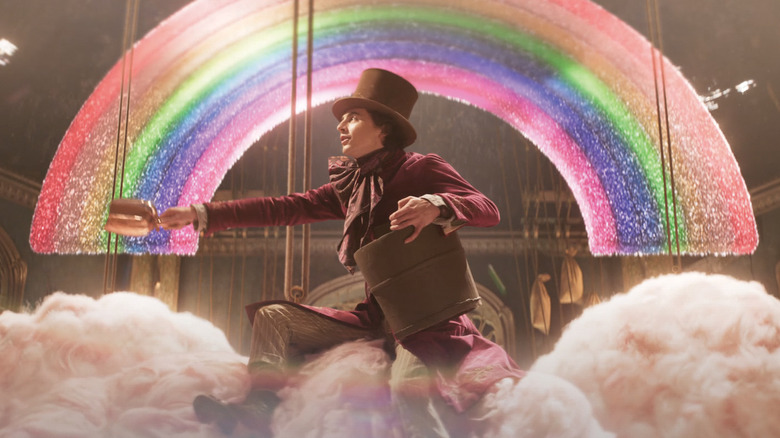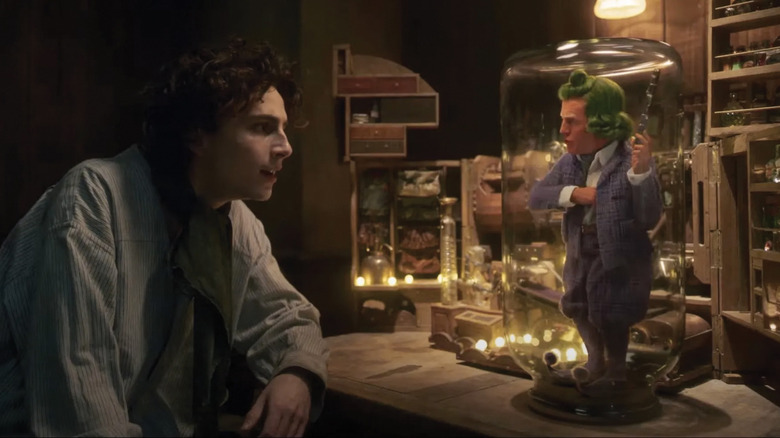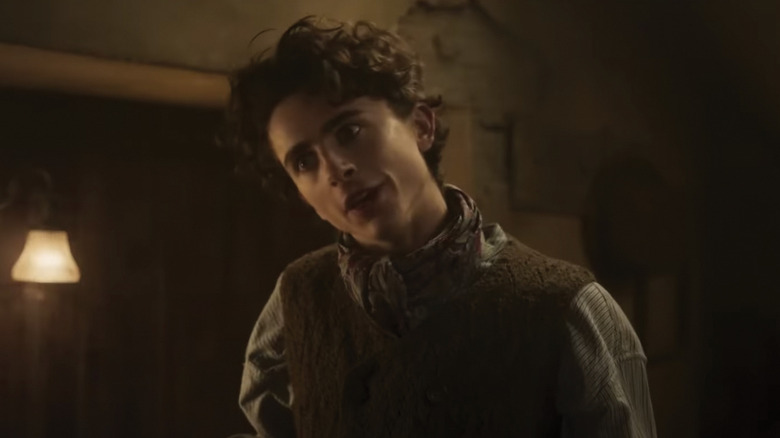Wonka Review: Whimsy And Wonder Abound, But Timothée Chalamet Dilutes The Magic
Gene Wilder delivered such a perfectly eccentric performance in 1971's beloved classic "Willy Wonka and the Chocolate Factory" that it's hard to imagine anyone else in the role. Tim Burton and Johnny Depp tried to make Roald Dahl's world their own back in 2005 with mixed results and a much more zany, quirky take on the character went in a much different direction.
When it comes to "Wonka," director Paul King, best known for the delightful "Paddington" movies, attempts to bring a dose of joy and kindness to the chocolatey world of Willy Wonka with an origin story that finds Hollywood's young heartthrob Timothée Chalamet ("Dune," "Call Me By Your Name") taking on the role of the young chocolatier as he tries to carve out a name for himself in the candy industry in a European town dominated by a chocolate cartel. Run by three titans of the industry, Slugworth (Paterson Joseph), Prodnose (Matt Lucas), and Fickelgruber (Mathew Baynton), the cartel has corrupted the chief of police (Keegan-Michael Key) to help them keep new candy entrepreneurs from threatening their iron grip on the market.
That's bad news for the young Wonka, who just sailed into town with a dream of sharing his unique, delicious chocolates with as many people as possible. But unlike the chocolate cartel, it's not just cold capitalism that's driving Wonka. Growing up in a remote jungle with his late mother, Wonka came to love her chocolate made from local cocoa beans. Believing a promise she made before she passed away, Wonka hopes to open his own chocolate shop and share the secret of her own special chocolate recipe, which he's yet to crack.
Beautiful sights and sounds
The chocolate cartel isn't the only wrinkle keeping Wonka from fulfilling his destiny. After rolling into town with naivete to spare, he trusts Mrs. Scrubitt (Olivia Colman) and Beacher (Tom Davis), who appear to be providing him a helpful deal for room and board while he goes into town to sell his chocolate. But they're really a pair of scam artists who have tricked him into signing a contract with loads of tiny print (sound familiar?) that forces him to pay off insane room rates and extra charges by washing laundry for years to come.
Wonka finds himself stuck here alongside other conned dreamers, including an accountant named Abacus Crunch (Jim Carter), the quiet phone operator Lottie Bell (Rakhee Thakrar), the plumber Piper Benz (Natasha Rothwell), and comedian Larry Chucklesworth (Rich Fulcher, as a total goof), who all came to town with big dreams but ended up stuck in Mrs. Scrubitt's basement washing clothes. All of this makes for a creative and whimsical origin story for Willy Wonka, who also finds a young companion of his own in Noodle (a charming Calah Lane), an orphan girl stuck working for Mrs. Scrubitt who sees a whole new side of the world thanks to Wonka's literally sweet dreams.
As Noodle helps Wonka sneak around and sell his chocolates to the public, not to mention understand the cynical world he's trying to infiltrate, we're treated to enchanting sights, thanks to the mesmerizing production design by Nathan Crowley. The market where the chocolate cartel operates is given this sleek, upscale European style, which works as a perfect contrast to Wonka's more fantastical, vibrant, and otherworldy approach to candy making.
Simultaneously, there are lovely sounds to be heard in the uplifting songs and music by Joby Talbot and Neil Hannon. Song and dance sequences are shot elegantly and seamlessly through the lens of cinematographer Chung-hoon Chung ("Oldboy," "The Handmaiden"), which may seem like a surprising choice for this kind of project, but when you think of how he maneuvers through scenes, especially the dance sequence in Edgar Wright's "Last Night in Soho," you'll understand how he easily breathes visual life into the musical scenes.
Not so pure imagination
However, as bewitching as many elements of "Wonka" might be throughout, there are scenes that feel undercut due to the use of visual effects rather than practical set design. Specifically, when Wonka finally gets the chance to open up his candy shop, the interior never feels tangible. You can tell it's created with digital visual effects, and that makes it less believable, which takes away some of the magic that made the original 1971 film such a treat. While individual candies are real and inspire genuine wonder, the store that Wonka creates just doesn't have that same appeal.
This same scene offers up the musical sequence "A World of Your Own," which is clearly framed to be the "Pure Imagination" moment of "Wonka." Unfortunately, it never feels like a true showstopper. The song somehow feels subdued, and I'm not sure it's because the orchestral peak of the music doesn't feel grand enough or because Timothée Chalamet doesn't have the strongest singing voice for a musical on this level. Chalamet's musical chops are on par with that of Johnny Depp in "Sweeney Todd: The Demon Barber of Fleet Street," where the actors have perfectly serviceable singing voices that carry a tune nicely but don't have the bravado to really drive the songs home in a powerful way.
A stellar supporting ensemble
Speaking of which, Chalamet might be the movie's greatest weakness. It's not that Chalamet is bad in the role, and it's commendable that he's trying a more silly performance outside of his comfort zone. The chief problem is that Chalamet's attempts at being goofy and quirky don't ever feel genuine. Chalamet desperately wants us to believe him, from his delivery of, "So quiet up, and listen down. No, strike that, reverse it," to asking Noodle how she likes her chocolate with an unnatural cranking of his neck, "Dark, white, nutty, absolutely insane?" But it always rings false.
Throughout the entire film, Chalamet certainly has charisma, and he's not unlikeable, but it never feels like he truly becomes Willy Wonka, and his performance is like a school play version of the character or a "Saturday Night Live" sketch adaptation. While there are moments of touching emotion for Chalamet that work beautifully, thanks to the backstory involving his mother (played in flashbacks by Sally Hawkins), the signature traits of Wonka lack authenticity, and it takes a lot of enchantment out of the movie's wonder.
Thankfully, the supporting cast of "Wonka" makes up for Chalamet's void. They might even be part of the reason that Chalamet's performance doesn't pop as much as it should. Everyone from Olivia Colman to the trio that makes up the cartoonish chocolate cartel knows that they're in a fantastical musical that follows in the footsteps of the recent "Matilda" adaptation, and they play up their characters with just the right amount of comedy. It should come as no surprise that Hugh Grant is a standout as an Oompa Loompa (not all the Oompa Loompas either, just one). Grant's wry but pointed delivery makes for an entertaining foil to Wonka, and he even gets some of the movie's most blatant callbacks to the original (though some of those lines come straight from the books, too). But honestly, the supporting characters are all so good that Wonka only feels like the film's star by default.
"Wonka" loses points among the supporting cast by putting Keegan-Michael Key in an increasingly large fat suit, as the chief of police who's addicted to the chocolate that the cartel uses to pay him for his corrupt acts in law. Though the script doesn't actively take jabs at his size through insulting dialogue, his increasing weight is clearly played up for laughs. There's certainly a way this plot element could have been executed comedically without using a character's weight as a punchline, but this is a flaw that goes all the way back to Roald Dahl's writing, and it's a shame that the filmmaker who gave us the kindhearted "Paddington" films couldn't avoid it.
Ultimately a sweet treat
Back on the positive side, "Wonka" does try to surpass the original "Willy Wonka and the Chocolate Factory" through the story's depth. The characters are richer, the parallels to real world woes from capitalism and even human trafficking are explored in a way that isn't shoveed in your face, but rather, the movie satirizes them stealthily, almost in a "Looney Tunes" fashion. It's a well-thought-out story that doesn't even lean heavily on nostalgia or cheeky references to the classic film adaptation, and those that are there have roots in the source material and don't feel shoehorned in for meaningless winks and nods.
So while Timothée Chalamet doesn't have the magic to hold the movie on his back, the movie around him is still rather splendid and enjoyable. Even if Chalamet ends up leaving a displeasing taste in your mouth, he doesn't end up ruining this sweet treat.
/Film Rating: 7 out of 10
